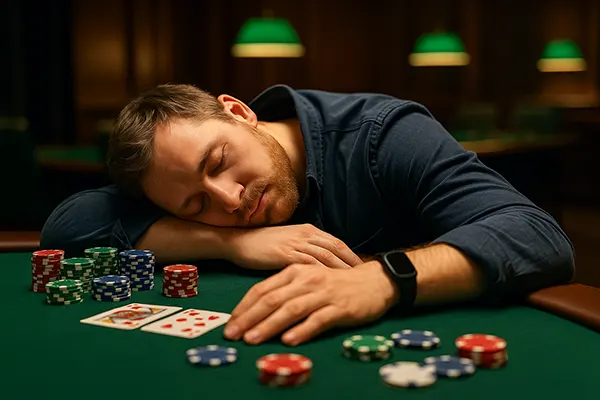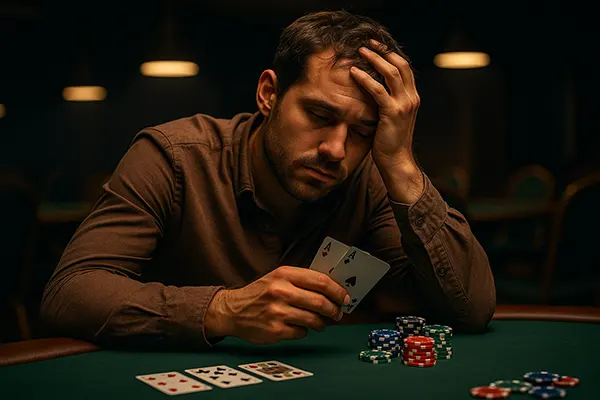
Poker and Sleep: How Sleep Patterns Influence Decision-Making at the Table
Understanding how sleep—or lack thereof—affects performance is vital for poker players striving to maintain focus and make smart decisions. Sleep directly impacts mental clarity, emotional regulation and decision-making ability, making it a key component in any player’s toolkit. Whether playing online tournaments or live cash games, managing sleep can be as critical as managing bankroll.
The Science Behind Sleep and Cognitive Function
Sleep plays a foundational role in memory consolidation, attention, and processing speed—all essential for analysing poker hands and reading opponents. During REM sleep, the brain processes information and stores patterns from previous experiences. For players who regularly study poker theory or review hand histories, sufficient sleep enhances retention and strategic application.
Furthermore, slow-wave sleep (deep sleep) helps clear metabolic waste and restore neural function. This type of rest allows the brain to reset and be fully alert during gameplay. Without it, a player’s ability to quickly assess odds or adapt strategies mid-session declines significantly.
Multiple studies confirm that sleep deprivation leads to impaired decision-making, especially in high-stakes or stressful conditions—typical scenarios in professional poker environments. Reaction times increase, emotional control falters, and irrational risks become more likely.
Impact on Logical Thinking and Probability Assessment
Logical thinking, especially when under pressure, is a core skill in poker. Lack of quality sleep reduces a player’s ability to apply logic consistently, often leading to poor calls or misjudged bluffs. The brain simply cannot compute odds or interpret ranges as efficiently when fatigued.
For example, in multi-level thinking—where players must consider not just their own hand but also their opponent’s perception of their hand—sleep-deprived individuals struggle to maintain this complexity. Their working memory shortens, and they revert to surface-level strategies that are easier but less effective.
Moreover, sleep deficits are associated with a decline in probabilistic reasoning. Fatigued players often misjudge pot odds or overestimate their equity, which can lead to bankroll-draining errors during long tournaments or marathon cash game sessions.
Emotional Regulation and Tilt Control
One of the most crucial aspects of poker is emotional stability. Sleep-deprived players are more vulnerable to tilt—emotional outbursts that lead to irrational gameplay. With compromised emotional control, even a minor bad beat can result in reckless betting or abandoning a sound strategy entirely.
Research indicates that the amygdala—responsible for emotional responses—becomes overactive when sleep is lacking. This can exaggerate reactions to negative stimuli and reduce the activity in the prefrontal cortex, which is vital for executive decision-making and risk management at the poker table.
Rested players are better at recognising when they are emotionally compromised and are more likely to step back, take breaks or adjust strategy. Fatigued players, on the other hand, often chase losses or double down impulsively, magnifying mistakes.
Stress Response and Long-Term Burnout
Extended periods of poor sleep increase cortisol levels—the body’s main stress hormone. Elevated cortisol leads to heightened anxiety, reduced focus, and increased irritability, all of which negatively influence a poker player’s performance and demeanour.
In tournament settings, especially during multi-day events, this stress can build up, causing players to crash mentally on the final day when optimal focus is required. Burnout is common among grinders who neglect sleep for volume, leading to diminishing returns despite longer hours played.
Implementing structured sleep hygiene practices—like regular sleep schedules, avoiding screens before bed, and creating restful environments—can significantly improve recovery and sustainability in long-term poker careers.

Practical Advice for Poker Players
Incorporating sleep optimisation into a poker routine is essential for both amateur and professional players. Planning play sessions around a proper rest schedule allows for better performance consistency. Avoiding caffeine or stimulants late in the day and setting limits on late-night grind sessions are practical steps to prioritise sleep without sacrificing volume.
For online players, especially those dealing with irregular time zones and international events, managing circadian rhythm through light exposure, meal timing, and pre-game wind-down routines is effective. Adapting sleep strategies before major tournaments helps ensure peak performance.
Some players also find value in power naps before evening sessions, which can restore alertness and cognitive clarity. However, this should not replace full sleep cycles. Long-term success at the tables relies on a consistent and restorative sleep routine as much as it does on strategy and skill development.
Using Sleep Tracking and Tech Tools
Wearable technology has become an asset for serious poker players. Devices like Oura Rings or smartwatches monitor sleep cycles, heart rate variability, and recovery indicators. This data helps players understand how their lifestyle and habits influence readiness for high-performance gameplay.
By reviewing trends over weeks, players can correlate performance dips with poor sleep, enabling them to make informed adjustments. For instance, noticing a drop in win rate after a sequence of poor sleep nights can prompt earlier bedtimes or rest days before crucial sessions.
While technology should not replace self-awareness, it provides valuable insights to refine sleep schedules, reduce burnout, and support consistent peak performance. Combining digital tools with discipline around rest can become a game-changing edge in competitive poker.
Popular
-
Casino transactions in 2026: chargeback, r...
When something goes wrong with a casino …

-
No-deposit casino bonuses: the restriction...
No-deposit bonuses can look straightforward: you register, …

-
No Deposit Bonuses: Conditions, Risks, and...
No deposit bonuses remain one of the …

